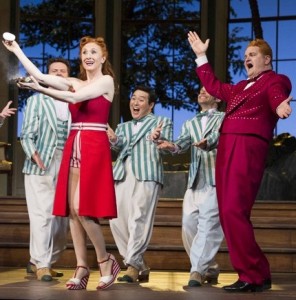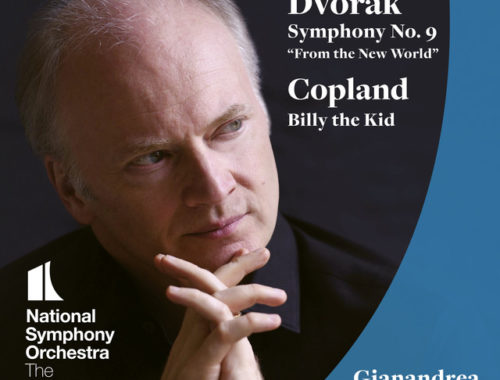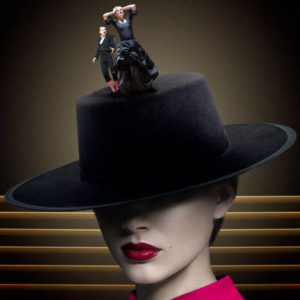Ariadne auf Naxos, Glyndebourne (Review)
 The Major-Domo promises fireworks during the Prologue of Strauss and Hofmannsthal’s Ariadne auf Naxos. Katharina Thoma, the director of Glyndebourne’s new staging, drops a bombshell – actually several bombshells. Glyndebourne’s wartime history – as a refuge for evacuees – would seem to have chimed with the darker implications of the opera within – namely the Composer’s opera seria of the title – and so here we are, in these darkest of days, occupying the house of a wealthy nobleman for sure but not in Vienna or even Germany but in deepest Sussex? So why, one wonders, is everyone speaking German when all the bunting and RAF propaganda screams England? And why is the enemy bombing country estates anyway? An offload of surplus munitions on the way back to Germany?
The Major-Domo promises fireworks during the Prologue of Strauss and Hofmannsthal’s Ariadne auf Naxos. Katharina Thoma, the director of Glyndebourne’s new staging, drops a bombshell – actually several bombshells. Glyndebourne’s wartime history – as a refuge for evacuees – would seem to have chimed with the darker implications of the opera within – namely the Composer’s opera seria of the title – and so here we are, in these darkest of days, occupying the house of a wealthy nobleman for sure but not in Vienna or even Germany but in deepest Sussex? So why, one wonders, is everyone speaking German when all the bunting and RAF propaganda screams England? And why is the enemy bombing country estates anyway? An offload of surplus munitions on the way back to Germany?
It’s unlike me to be so literal, even pedantic, about this free and fanciful world of opera but when a director imposes such a specific layer of subtext onto what is essentially a delicious confection about two theatrical worlds colliding, and how the one informs and enriches the other, then such anomalies can rankle and irritate. But then again Julia Müer’s rather unprepossessing set hardly suggests realism and once the Vaudevillians (the commedia dell’arte element) arrive, led with showbizzy vivacity by Laura Claycomb’s Zerbinetta, all bets are off as to where we might be headed. There is a key moment in this Prologue where Strauss and Hofmannsthal absolutely nail the essence of their conceit – and to her credit Thoma does, too. This is the interlude where Zerbinetta and the Composer (the wiry and intense and thoroughly excellent Kate Lindsey) are alone and he begins to see the real woman behind the hoofer/comedienne facade while she in turn glimpses that elusive Mr. Right. Her unexpected kiss, full on the lips, is a huge moment and one that Thoma intriguingly carries forward into the Opera proper.
So gone – wiped out in the pre-dinner raid – is the makeshift set and drooping palm of Ariadne’s desert island (the palm, acting as a kind of barometer of the Composer’s wilting prowess, is but one instance of Thoma’s decidedly German humour). In the wake of catastrophe in this little corner of England the stately home is now a hospital where Ariadne (Soile Isokoski) pines away for her one true love in the valley of the shadow of death dutifully attended by her trio of nymphs turned nurses (Ana Maria Labin, Adriana Di Paola, and Gabriela Istoc) while the composer, shell-shocked, traumatised, ponders the outcome of his score. The mournful nature of the unfolding opera sits well with the pall of the sick room and once we identify the Vaudevillians as members of ENSA there is point and purpose in their wholehearted attempts to raise everyone’s spirits.
The problem, I think, is that Thoma simply overworks her premise so that when Zerbinetta attempts to relate to Ariadne woman to woman in the ear-popping coloratura of her lecture on the joys of sexual promiscuity, for instance, the rudeness of Laura Claycomb’s teasingly voiced multiple orgasms is so explicitly physical that Thoma seems to think it necessary not just to sedate but to straightjacket her, too. That’s a bit of business too far and for all that it is intricately tailored to the music there is overkill in her point-making – a young director flexing her creative muscle. I miss, too, the mythical element so that Ariadne’s transfiguration in the arms of her one true love is almost mundane in its understatement.
Vladimir Jurowski and his trimmed down London Philharmonic Orchestra work wonders with Strauss‘ luminescent scoring always maintaining that very telling balance between intimacy and grandiosity, the world of musical theatre versus opera, the pit band that would be symphonic. Experience pays, too, in the casting of Thomas Allen as the Music Master and, most notably, his leading lady – the Prima Donna/Ariadne of Soile Isokoski. She may not now epitomise the glamour and vocal bloom we have come to expect of the role but in a house this size her wholeheartedness and musicality shine through.
And who’d have imagined that her Bacchus (the brave but challenged Sergey Skorokhodov) would turn out to be the First of the Few? Not Strauss, not Hofmannsthal. But that’s why we love Opera, isn’t it?
photo: Alistair Muir


